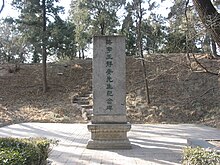Wang Guowei
| Wang Guowei | |
|---|---|

The Monument of Wang Guowei in Tsinghua University
|
|
| Born |
2 December 1877 Haining, Zhejiang, Qing China |
| Died | 2 June 1927 (aged 49) Kunming Lake, Summer Palace, Beijing, China |
| Cause of death | Suicide by drowning |
| Wang Guowei | |||||||||||||||||
| Traditional Chinese | 王國維 | ||||||||||||||||
|---|---|---|---|---|---|---|---|---|---|---|---|---|---|---|---|---|---|
| Simplified Chinese | 王国维 | ||||||||||||||||
|
|||||||||||||||||
| Transcriptions | |
|---|---|
| Standard Mandarin | |
| Hanyu Pinyin | Wáng Guówéi |
| Gwoyeu Romatzyh | Wang Gwowei |
| Wade–Giles | Wang2 Kuo2-wei2 |
| IPA | [u̯ǎŋ ku̯ǒu̯ěi̯] |
| Wu | |
| Romanization | Waõn Kueʔ-vi |
Wang Guowei (Chinese: 王國維; 2 December 1877 – 2 June 1927), courtesy name Jing'an (靜安) or Boyu (伯隅), was a Chinese scholar, writer and poet. A versatile and original scholar, he made important contributions to the studies of ancient history, epigraphy, philology, vernacular literature and literary theory.
A native of Haining, Zhejiang, he went to Shanghai to work as a proofreader for a newspaper, after failing to pass the Imperial Examination in his hometown, at the age of 22. There he studied in the Dongwen Xueshe (東文學社), a Japanese language teaching school, and became a protégé of Luo Zhenyu. Sponsored by Luo, he left for Japan in 1901, studying natural sciences in Tokyo. Back in China one year later, he began to teach in different colleges, and devoted himself to the study of German idealism. He fled to Japan with Luo when the Xinhai Revolution took place in 1911. He returned to China in 1916, but remained loyal to the overthrown Manchu emperor. In 1924, he was appointed professor by the Tsinghua University, where he was known as one of the "Four Great Tutors," along with the prominent Chinese scholars Liang Qichao, Chen Yinke, and Y. R. Chao.
In 1927, Wang drowned himself in Kunming Lake in the Summer Palace before the revolutionary army entered Beijing.
Chen Yinque's epitaph read: "The suicide of Wang was because he worried about losing the independent spirit and free thought he long cherished in his academic pursuit."
...
Wikipedia
